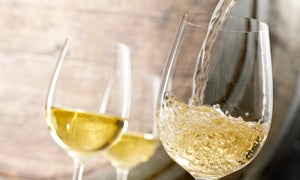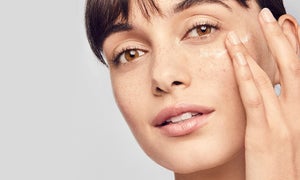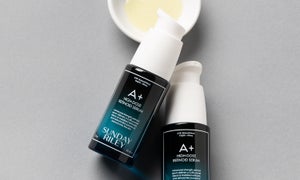

If you’re lucky enough to visit a super-luxe spa, you probably notice that champagne is a rare find, while cucumber water or a calming tea is more the norm. While a glass of your favorite libation might make you relaxed more than herbal tea, when it comes to your overall health, frequent alcohol consumption can have long-lasting and negative effects on your skin. As the largest organ in your body, what you order at your favorite bar can make or break your skin’s texture, color and even spark a reaction to products.
Your skin will be persistently red, even when you're not drinking.
As board-certified dermatologist Tsippora Shainhouse, MD explains, “One of the earliest signs of alcohol abuse is a persistently red face due to enlarged blood vessels (telangiectasia). This appears because regulation of vascular control in the brain fails with sustained alcohol intake. It can involve the neck and chest and eventually the arms, legs, trunk.”
Though you will probably wake up the next morning slightly hungover, if you develop a regular habit of binge drinking, Dr. Shainhouse says this condition can worsen and is difficult to treat. “The telangiectasias will not go away if you stop drinking, but you may stop getting new ones,” she says. With laser skin treatments, you might see the redness lessen, but it takes a lot of time and money.
Your skin will likely flush with just a few drinks.
According to Dr. Shainhouse, 40 percent of Northeastern Asians experience flushing and elevated heart rate after drinking just a few glasses of alcohol, due to a gene mutation. “Flushing is due to accumulation of acetaldehyde, the main breakdown product of alcohol, in the blood. Acetaldehyde is thought to cause flushing by stimulating release of histamine. Taking a non-sedating antihistamine pill about an hour before drinking might prevent some of this redness,” Dr. Shainhouse explains.
Alcohol can trigger psoriasis and rosacea symptoms.
If you already suffer from skin conditions, you might want to think twice before indulging in unlimited drinks by the pool, especially white wine. Why? You might experience increased flare-ups and breakouts that can be painful and difficult to manage. “Acne rosacea is a condition of chronic mild inflammation that is associated with facial redness, enlarged telangiectasias and often acne. This redness can occur after a single drink,” Dr. Shainhouse says.
Those who drink more than 80 grams of alcohol per week have been found to have severe treatment-resistant psoriasis, according to Dr. Shainhouse. “The reasons for this may be immune suppression induced by alcohol and/or that alcohol induces proinflammatory cytokines. Heavy drinking reduces options for treatment of psoriasis, as some medication can be contraindicated if your drinking leads to liver disease or high levels of triglycerides in the blood,” she says.
Try: Avene Antirougeurs Fort Relief ConcentrateAlcohol makes your skin age faster.
After a night out on the town, your go-to remedy is to probably take a triple-shot of espresso, followed by a pint of water---desperate to wake up and rehydrate. Though it might feel like your head and stomach are the only parts of your body aching for some H2O, Dr. Shainhouse says that skin dehydration also happens when you’re drinking. Dehydrated skin can lead to wrinkles reflecting back to you in your vanity mirror.
“Acetaldehyde (what alcohol gets broken down to) produces reactive free radicals and damages DNA. This leads to the breakdown of collagen fibers, skin inflammation, skin hyperpigmentation and can cause wrinkles. If you must drink, incorporate antioxidants in your daily diet, like bright colored fruits and vegetables and antioxidant serums into your skin care routine. Wear a broad-spectrum sunscreen every day to minimize UV as a second source of DNA oxidation and collagen breakdown,” she says.
Try: HUM Nutrition Wing ManAlcohol is also tough on your nails.
Trying to grow out your nails for a wedding or a fun event, but you can’t seem to get past a certain length? Dermatologist Dr. Debra Jailman, M.D. explains that the dehydration side effect of alcohol impacts more than just your skin, but your nails too. “With excessive drinking, your nails will become brittle, more prone to peeling, dry and easier to break,” she explains. “I recommend taking a biotin supplement 2.5 mg daily. I also recommend putting a hydrating moisturizer or a cuticle oil on the nails to keep them hydrated. Limit nail polish because the acetone in the remover is also very drying. If you're going to wear nail polish don't change it that often. Maximum once per week.”
Try: Nailtiques Oil TherapyAlcohol means you’ll have to use more conditioner.
Your locks aren’t free from damage from those vodka-tonics either. As Dr. Jailman explains, overdoing it on the booze can make your hair become dry and more prone to split ends and breakage. To combat this, she suggests using conditioner every day and doing a deep conditioning treatment once a week. “Limit heat styling tools like straightening irons and curling irons. Check the temperature and try to use a lower temperature. Like about 300 to 315 degrees,” she adds.
Try: Briogeo Don't Despair, Repair! Deep Conditioning Mask
Lindsay Tigar is a travel and lifestyle journalist who contributes to a myriad of publications—from Travel + Leisure and Vogue to Glamour and countless others. She's a digital nomad who works from every corner of the globe, scoping out the best coffee, collecting artisan crafts and testing every beauty product she can find. You can find a collection of her work at LindsayTigar.com.
Related Articles






